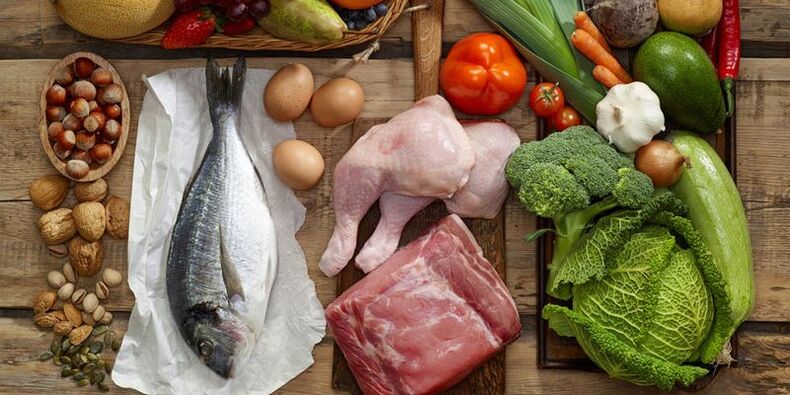
We have studied a few dozens of serious scientific research and collecting diets that will definitely help you lose weight.You just have to choose the diet that will not force you to suffer, and make it part of your life.
1. Diet Atkins
This low fuel diet was developed in 1960 by cardiologist Robert Atkins.The diet involves several stages and is aimed at changing food habits to healthier ones.
What is the essence of the diet
The Atkins diet does not include calculating calories or portion control.The only thing to count is the pure carbohydrate grams minus fiber.
The diet is divided into four stages:
- The first stage is strict, lasts at least two weeks and allows you to lose 3-4 kg.At this time, you reduce the amount of carbohydrates to 20 g per day, and you get 12-15 g of them from vegetables.You consume a lot of protein from poultry, meat, fish and seafood, eggs, cheese, while completely excluding fruits, sweet pastries, pasta, grain, nuts.It is necessary to refuse alcohol and drink eight glasses of water a day.
- You continue to consume 12-15 g of vegetables and avoid sugar, but gradually return some products rich in useful substances: nuts, seeds, berries.You lose weight and switch to the next stage only when it remains about 4.5 kg before your goal.
- You gradually present previously banned food in the menu: fruits, starch vegetables, whole wheat products.You can add 10 g of carbohydrates.But if you start gaining weight again, you have to return to the rate at 20 g.At this stage, you remain until you reach your perfect weight.
- Productsdo product is allowed, but you continue to adhere to the principles of diet.If you start gaining weight, return to the previous stage.

What does science say
In 2007, the University of Stanford studied the effectiveness of four popular diets: Atkins, Ornisha, "Areas" and learn (low -fat diet).After 12 months, atkins sitting in the diet lost 4.7 kg, 2.6 kg in the lesson diet, 2.2 kg in the ornica diet and in the "Zone" diet - 1.6 kg.
In general, many studies confirm the benefits and effectiveness of low fuel diets.For example, a recent scientific summary of six studies showed that diets with a low glycemic index or low glycemic load allow you to burn an average of one kilogram more than others, positively affect your body weight, fat amount and cholesterol.
Another study showed that diets with a high protein content and a low glycemic product index contribute to weight storage.
Potential
The search center article says a diet with a sharp reduction in the number of carbohydrates may have the following side effects:
- Headaches.
- Dizziness.
- Weakness.
- Constipation.
Atkins diet is not recommended for people with kidney disease, women during pregnancy and breastfeeding, as well as people with high physical activity.
It is believed that you should not sit on low fuel diets constantly, as this can cause health problems.But scientists still should not prove this.So for now it is better to consult a therapist.
2. Paleodit

In 2013, paleodism became one of the most popular in the world, though there is still no consensus among nutritionists whether this diet is useful or not.
What is the essence of the diet
Paleoding is based on products that our distant ancestors ate before the emergence of agriculture.
Proponents of the diet argue that, despite the thousands of years that have passed since, the human body is even best facing the food of hunters and collectors.
The menu includes meat, fish, eggs, vegetables and fruits, nuts (other than peanuts) and seeds.Ideally, the meat should be from animals grown under natural conditions, without the use of special food.The game is also appropriate.
The diet completely excludes sugar, starch vegetables, milk and wheat products, oils (in addition to cold olive printing, nuts and avocados), legumes, tea, coffee, carbonated and alcoholic beverages, fruit juices.
What does science say
In 2007, scientists compared the effect of paleo- and Mediterranean diet without calories.
After 12 weeks, people in the Palestity lost an average of 5 kg (in the Mediterranean - 3.8 kg) and lost 5.6 cm in the waist (in another group - 2.9 cm).On average, people from the Paleo group consumed 451 kcal a day less than in the control group, and without any restrictions.In addition, their blood sugar levels normalize.
The benefits for the picture were confirmed in the 2009 study. For three months, one group contained Paleodieta, the other - a common diet for diabetics.As a result, the first fell 3 kg more than the second.
A long -term 2014 study is also interesting.Subjects were divided into two groups: for two years some adhere to Paleodiet, others - a high carbon diet with a low amount of fat.The Paleodine group lost more fat, especially abdominal, after 6, 12 and 18 months.
Potential
Nutritionists call them many possible dangers of Paleodieta, among which:
- Disadvantage of calcium due to lack of dairy products.
- Deterioration of the kidney condition due to the consumption of a large amount of protein and saturated fats.
- Increased risk of cardiovascular disease due to the consumption of a large amount of meat.
However, despite the potential negative effects of the diet, there are no studies that prove clear damage to health.
3. Vegan diet

The term "vegan" appeared in 1944 thanks to the group of vegetarians who formed the Vegan society.They decided to stop using animals in any form and abandon not only meat but also from eggs and dairy products.
What is the essence of the diet
The vegan diet does not include meat and poultry, fish and seafood, eggs, dairy products, as well as dishes that may include animal ingredients: gelatin, casein, 2-hydroxypropal acid.
Plant products are consumed without any restrictions.Vegans eat legumes, tofu, nuts, seeds, vegetables and fruits, drink coconut milk and almonds.
What does science say
A random 2013 study showed that a low retail vegan diet can significantly reduce weight.
After 18 weeks of search, Vegans were rescued from an average of 4.3 kg, and people from the 0.1 kg control group.The first in the first, cholesterol and blood sugar levels decreased.
Scientists received similar results in 2005. After 14 weeks, people who rejected animal products threw 5.8 kg, and people who replaced carbohydrate -saturated fats (NCP diet) - 3.8 kg.Vegans also lost more centimeters in the waist.
A two -year study completed in 2007 also confirmed the effectiveness of a vegan diet to reduce weight.64 women with overweight adhere to either a vegan diet or a NCP diet.As a result, a year later, Vegans threw 4.9 kg, and participants in the NCP diet were 1.8 kg.According to the results of two years, the weight loss in the vegan group was 3.1 kg, and in the NCP group - 0.8 kg.
But in 2015, scientists compared the effectiveness of vegan, vegetarian, sand (fish and seafood), semi -detachment (only red meat) and not -heir diets to reduce weight.As a result, in six months, vegans lost an average of 7.5% of body weight - more than everyone else.
Potential
The main risk of a vegan diet is the lack of vitamin B12, needed for human health and taken from animal products.
The lack of B12 can be transformed into anemia, chronic fatigue, depression.Moreover, the 2015 study showed that the lack of this vitamin increases the risk of cardiovascular disease among vegetarians.Therefore, by undergoing a vegan diet, they are advised to accept B12 additives.
In terms of protein, it can be obtained from the products.
4. Mediterranean diet with calorie restrictions

Unlike high -speed diets like grapefruitova, the Mediterranean cannot boast fast results.However, it is much more effective in the long run and helps maintain not only weight but also health.Moreover, observation of this diet is easier and more pleasant, which also affects its effectiveness.
What is the essence of the diet
Here are the basic principles of the Mediterranean diet:
- The diet base is fruits and vegetables, whole wheat products, legumes, nuts, cheese and yogurt.These products can be eaten daily.
- Butter is replaced with olives and rapeseed.
- Red meat, eggs and sweets should be eaten as little as possible, or can be completely excluded from the diet.
- Fish and bird should eat at least twice a week.
- You should drink six glasses of water a day.Sometimes you can drink red wine.
- You need to add a small exercise.
What does science say
Most of the Mediterranean diet studies have to do with its benefits to heart health.For example, Dr.Ramon Estruch drew 7,447 people in his five -year study and proved that the risk of stroke and heart disease in the Mediterranean diet decreases by 28-30% compared to a low -fat diet.
And although the Mediterranean diet is most often used to prevent cardiovascular disease, it is also effective for weight loss, especially in the long run.This is confirmed by numerous studies.
Meta -Case -controlled case analysis showed that the Mediterranean diet can become a useful tool for weight loss, especially if you cut the diet calorie content.
5. The diet of an ornisha

This is a low -fat diet, invented by Dean Ornish (Dean Ornish), a professor of medicine from the University of California.It aims to improve heart health, get rid of excess weight, reduce cholesterol and blood pressure.
What is the essence of the diet
The main rule of the ornical diet - fat should be no more than 10% of the total calorie rate.At the same time, it is advisable to exclude meat and fish, butter and margarine, olives, avocados, seeds, nuts, oil products, sweet, alcohol.
The diet may contain low retail dairy products, egg protein, low cracks.Without restrictions, you can consume legumes, fruits, cereals, vegetables.
In addition to the diet, Ornish advises to perform physical exercises (at least 30 minutes about five days a week or 60 minutes three days a week), withstand stress with yoga and meditation and spend time with loved ones.
What does science say
The Ornish study, published in the International Medical Scientific Gazette in 1998, showed that the people who adhere to his diets were lost by 10 kg during the year, and after five years they supported weight, 5 kg different from the original.
In the study mentioned above by Stanford University, people sitting in the Ornisha diet lost on average 2.2 kg a year.However, Dr.Michael L. Dansinger) received other results in 2005. During the year, ornical subjects lost 3.3–7.3 kg in the Ornic diet, and those sitting in atkins diet 2.1–4.8 kg.
Potential
As in the case of a vegan diet, people in an Ornisha diet may suffer from lack of protein and vitamin B12.Therefore, it is worth taking this vitamin in addition and more often to include legumes rich in vegetable protein in the diet.
What do you mean
As you can see, all diets are very different.Atkins diet restricts carbohydrates, ornisha - fats.Paleoding focuses on the meat, and the vegan meat completely eliminates.Moreover, scientific research confirms the benefits and effectiveness of all these diets.And it's just great!
Choose a diet that will not make you give up on your favorite products.You can't live without meat, choose a paleo diet or atkins.Lee paste, become vegan or respect the Mediterranean energy regime.If you can easily do without fatty foods, the ornical diet will help you lose weight.














































